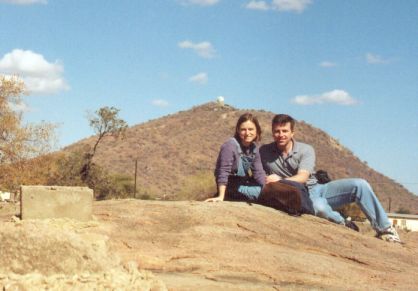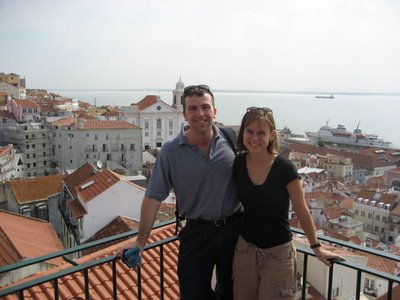
View over Alfama: old Moorish quarter of Lisbon
We have spent the last 5 weeks in Lisbon (“Lisboa”), Portugal for a crash-course in Portuguese, the lingua franca of Angola. Our language instructor, Eunice, is absolutely fantastic - language instructor, cultural interpreter, historical guide, coach, cheerleader, travel consultant, culinary counselor, and friend.
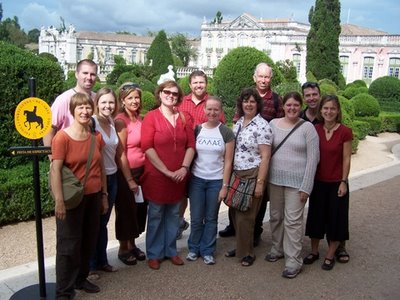
Outing to Queluz Palace with Eunice (center, sunglasses) and other language students
We live in the village of Tojal on the outskirts of Lisboa. Our day-to-day lives are pretty simple. We each have 2.5 hours of class a day, one-on-one with Eunice. We spend much of the rest of our time studying, with forays to cafes for lunch. We now have our favorite cafe waiter, pastry shop employee, juice seller, and bus driver. Views around Tojal and our home at the Instituto Biblico Português
Views around Tojal and our home at the Instituto Biblico Português
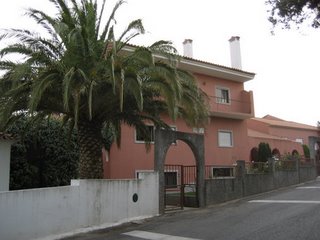
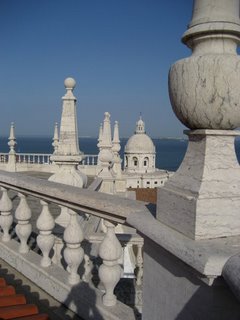 We were also very blessed to be visited by dear college friends, Rik and Alison, who now live in Amsterdam. We visited a number of historic places in Portugal - I think I caused everybody their fill of castles, palaces, cathedrals, and monasteries.
We were also very blessed to be visited by dear college friends, Rik and Alison, who now live in Amsterdam. We visited a number of historic places in Portugal - I think I caused everybody their fill of castles, palaces, cathedrals, and monasteries.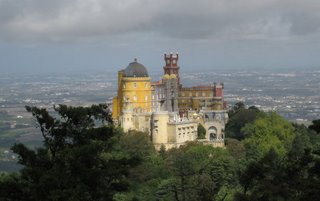
Lisbon skyline
Sintra: City of Palaces
Tomar: Last home of the Knights Templar
Next week we fly to Luanda, Angola's capital. We will be there a few days before heading to Lubango. The stories below reflect how our time has been spent in the last 5 weeks: understanding (and misunderstanding) Portuguese.
Perfecting Pastries
In learning a language, I (Beth) decided to fall back on my known strengths. Therefore, I am conquering Portuguese one pastry at a time. Most days I go to one of my two favorite cafes (there are approximately 103 cafes in the 2 blocks between our bus stop and our language class), and I ask what things are called. The patient café workers explain the items slowly in Portuguese, as onlookers giggle and nod knowingly. They say, "gjhshdgfjsdhgfjsdhgfhsjdgf?" And I say, "Yes ... I – am – learning – Portuguese." Appreciative nods, words of instruction from everyone present, much hand-waving.
Pastries and Pooping – in Portuguese
My other subject of interest is, of course, medicine. Sometimes food and medicine overlap … it turns out we can ask our patients if they had a coco (poop), or we can have a pastry called pão de Deus (‘bread of God’), with coco (coconut) on top. Note: one ‘coco’ has the accent on the first syllable, the other on the second. Very unfortunately, I cannot remember which is which right now, but it turns out to be rather important.
Language Acquisition Made Practical
Finally, a friend asked me (Robert) for hints on picking up Portuguese. Here are some for starters, with apologies to any who actually do speak the language.
1) any word ending in 's' or 'z' actually ends in 'sh'
2) when in doubt throw in an 'sh'
3) when in doubt, add an article
4) if the word ends in '-cion' in Spanish, or '-tion' in English, it will end in '-ção' in Portuguese (which is pronounced like 'sow' while pinching your nose off)
5) when in doubt, make it nasal
6) when in doubt, thrust your tongue to the back of your throat
7) 'no' is 'new' and means 'in' if the object is masculine
8) 'não' is 'now' and means 'no'
9) Portuguese words never end in 'n', if you feel the word should end in 'n', put an 'm' there and pronounce it like 'n' without letting your tongue touch the front of your palate
Favorite Words
Beth’s: um despertador (means ‘alarm clock’; note the similarity to the English word ‘desperation’. Coincidence? I think not.)
Robert’s: puxe (pronounced 'push', means 'pull').
Both: ‘Avó’ means grandmother and ‘Uva’ means grapes. Every day as we observe the careening buses and older women walking by with their wares, we wonder if the ‘avós will be squished like uvas’.
Portuguese tile work is wonderful,
and everywhere
Items for Prayer
For those inclined to do so, we’d love your prayers for:
1) Continued endurance as we learn Portuguese here and in Angola, and for ears that can hear Portuguese and tongues that can speak it.
2) Grace, kindness and love - for each other and for those around us.
3) God's blessing on the details of making final arrangements for our departure.
4) Further grace for our arrival in Angola. Challenges include - the arrival to Luanda's airport, arranging necessary meetings in Luanda, and safely and efficiently getting ourselves and our belongings to Lubango.
